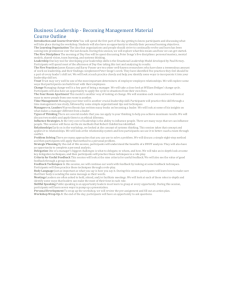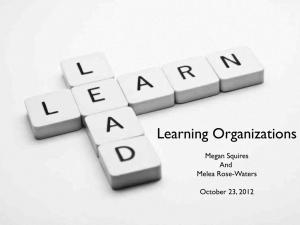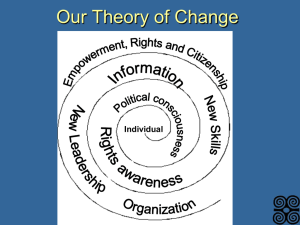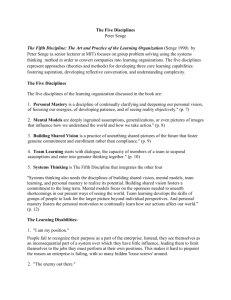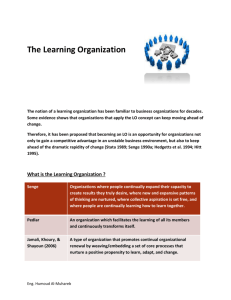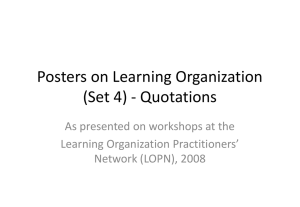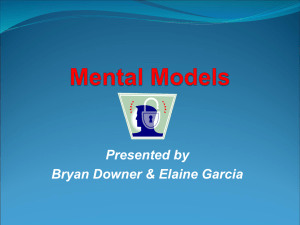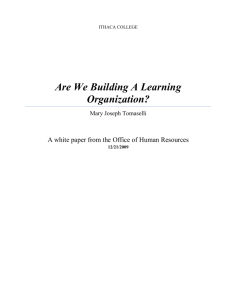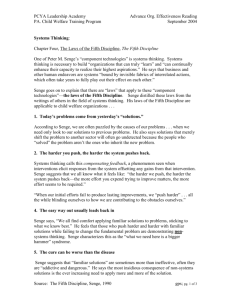Leadership and Learning: A Critical
advertisement
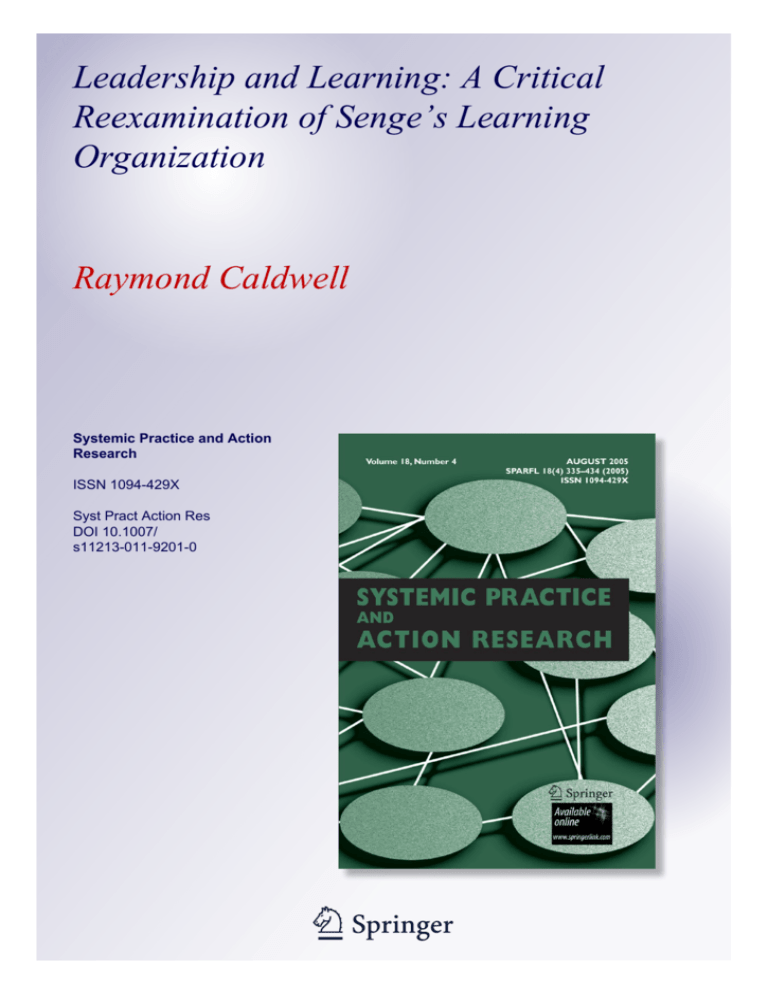
Leadership and Learning: A Critical Reexamination of Senge’s Learning Organization Raymond Caldwell Systemic Practice and Action Research ISSN 1094-429X Syst Pract Action Res DOI 10.1007/ s11213-011-9201-0 1 23 Your article is protected by copyright and all rights are held exclusively by Springer Science+Business Media, LLC. This e-offprint is for personal use only and shall not be selfarchived in electronic repositories. If you wish to self-archive your work, please use the accepted author’s version for posting to your own website or your institution’s repository. You may further deposit the accepted author’s version on a funder’s repository at a funder’s request, provided it is not made publicly available until 12 months after publication. 1 23 Author's personal copy Syst Pract Action Res DOI 10.1007/s11213-011-9201-0 Leadership and Learning: A Critical Reexamination of Senge’s Learning Organization Raymond Caldwell Springer Science+Business Media, LLC 2011 Abstract From its inception the concept of the learning organization has been identified with a particular type of organization or new forms of organizational learning. But it is often forgotten that Senge’s ‘system thinking’ formulation of the learning organization was inseparable from an attempt to reformulate a new way of thinking about change agency and leadership in organizations. Here it is argued that Senge’s learning organization can be re-conceptualised as a partial fusion of ‘systems thinking’ and learning theories that leads to a concept of organizational learning as a form of ‘distributed leadership’. However, the concept is critically flawed because it cannot theorise the organizing practices by which learning to lead and leading to learn are shared or distributed in organizations. It is concluded that Senge’s under-theorized focus on distributed leadership consistently neglects issues of practice and issues of power. As such his work does not provide an exploration of the possibilities for increasing the dispersal of human agency, power, knowledge and autonomy within the workplace. Keywords Systems thinking Organizational change Distributed leadership Action research Agency Introduction Explorations and critiques of Senge’s concept of the learning organization have often focused on its status as theory of organizational learning, while consistently underplaying its underlying claims to identify leadership with learning (Easterby-Smith 1997; Driver 2002; Smith 2008). The learning organization emerged in parallel with ‘new leadership’ discourses which sought to create alternative models of change agency, leadership and organizational change (Senge 1990b, 1996c; Bass 1990, 2000; Berson et al. 2006). These models were identified with more inclusive and participative modes of ‘distributed leadership’ that were essential in ensuring the sustainability of change through new forms of R. Caldwell (&) Birkbeck College, University of London, London, UK e-mail: R.Caldwell@bbk.ac.uk 123 Author's personal copy Syst Pract Action Res organizational learning (Gronn 2002, 2009; Harris et al. 2007). For Senge distributed or shared leadership was a post-heroic mode of leadership and a new type of change agency; it was not an attribute of individual leaders or expert change agents, but a process of system learning that could be shared by many people. In this sense distributed leadership appeared learning-centred rather than leader-centric; in learning organizations leadership of the many would take priority over leadership by the few (Senge 1996c, 2006). But just as Senge’s conjoining of ‘organization’ and ‘learning’ was always profoundly opaque, so too was his implicit identification of leadership and learning (Elkjaer 2001; Friedman et al. 2005; Ortenblad 2007). Learning is intrinsically a highly problematic concept in cognitive or psychological terms, and this is compounded if ‘agency’ as an action-theoretic concept of intentionality, or the ability to act, is identified primarily with the capacity to learn. Learning as action may seem self-evident, but it raises enormous issues in specifying how individual learning can become ‘rational’ or ‘effective’ in the face of ‘defence reasoning’ and ‘self-deception’ (Argyris 2004). Nor is the problematic nature of learning as action resolved by shifting it from the individual to the organization-level as a shared construct (Weick 1991; Ortenblad 2002; Contu et al. 2003; Marshall 2009). If one does not know what organizational learning is or how it is shared, then how can it be distributed? Senge’s embrace of distributed leadership appears to partly address this issue by treating learning as a feedback process and leadership as a transmission mechanism within an overall normative system of shared meaning. Learning is not an individual behavioural attribute or capability but a ‘double-loop’ cognitive learning process that can be shared; and if everyone can participate in shared learning then, in principle, everyone is capable of leading (Senge 2006). The learning organization therefore promises what the classic humanist belief in learning always cherished: that commitment to learning will ultimately set us free from compliance to blind authority. Yet this idealised vision of workplace empowerment in which leadership and change agency appear to be a distributed function of shared learning is deeply deceptive and ideologically suspect (Wilmott 1993; Driver 2002). Senge’s reinvention of the classic organization development (OD) tradition as a new paradigm of organizational learning was not simply a shift away from the increasingly outmoded tools and instrumental techniques of OD, and its marginal status as a subordinate organizational sub-function, it was also a move to reposition ‘learning’ as a higher order strategic activity within the remit of leaders. This partly explains the enormous appeal of the learning organization and its compatibility with new leadership discourses of transformational change. For Senge (2007) learning is not an empowering practice or a process of participative learning, but a vision: a sense of shared learning takes place within a normative system of meaning that is defined by leaders. Paradoxically, the idea of the learning organization only appears to make sense if it is enacted by leaders who have the power, knowledge or expertise to define what learning is, how knowledge is stored or transmitted, and how it is used to steer or set the direction of future learning. Ultimately distributed leadership fails to address issues of ‘agency’ (the power to act) or expertise (knowledge as power) and as a consequence the learning organization reproduces an apolitical and prescriptive systems model of normative consensus and ‘concertive control’ that identifies power with shared learning (Barker 1993; Wilmott 1993; Driver 2002; Grieves 2008). This article offers a critical re-examination of the learning organization by conceiving it as a theory of distributed leadership, change agency and workplace empowerment: core ideas that Senge outlines but never fully develops. It argues that Senge’s systems-based concept of organizational learning and his implicit notion of ‘distributed leadership’ do not offer an adequate critical reappraisal of the four key components of ‘agency’ that Senge 123 Author's personal copy Syst Pract Action Res inherited from the OD and action research traditions: rationality, expertise, autonomy and reflexivity (Caldwell 2006). Instead, ‘agency’ as a form of intentional action and iterative behaviour with unintended consequences is subsumed within the behavioural regulations of ‘systems archetypes’; thereby undermining an analysis of how human action and learning is produced, reproduced and transformed through social practices of learning that are constantly changing (Bourdieu 1977; Giddens 1984). Senge (2006) may wish to affirm a non-hierarchical vision of the workplace with people as ‘active participants shaping their reality’, but his identification of the learning organization with system reproduction and a power-neutral concept of distributed leadership radically limits the scope of autonomy and reflexivity necessary for this to occur. Systems Thinking, Organizational Change and Leadership Senge (2006) examined five ‘disciplines’ in his original formulation of the learning organization: ‘systems thinking’ (the exploration of wholes rather than individual parts); ‘personal mastery’ (forms of self-development and individual learning); ‘managing mental models’ (cognitive models of system change and learning); ‘building a shared vision’ (creating a common sense of purpose); and ‘team learning’ (creating new forms of shared learning and knowledge). It was, however, his conjoining of ‘systemic thinking’ with learning as ‘the fifth discipline’ rather than the other four supporting disciplines that allowed the concept of the learning organization to assume an enormous appeal as a theory of personal change and organizational transformation: ‘‘Systems thinking is a discipline for seeing wholes. It is a framework for seeing interrelationships rather than things, for seeing patterns of change rather than static ‘snapshots’.’’ (Senge 1990a: 23). It is the fifth discipline that ‘integrates the disciplines, fusing them into a coherent body of theory and practice’ (Senge 1990a: 12). With this synthesis Senge (1991) appeared to blend the hard and soft traditions of systems thinking into a practice-oriented manifesto of workplace empowerment and transformation. He freely incorporated the ‘practical problem solving’ models of ‘systems dynamics’ into his work; a clear reflection of his legacy as a graduate in engineering (Stanford) with a masters in social system modelling and a doctorate in management from MIT. In addition, Senge borrowed selectively from the soft prescriptive and optimistic strands of cognitive learning theories and the broader OD tradition stretching back to Kurt Lewin’s (1999) classic work on ‘action research’ and group learning through reasoned dialogue (Burnes 2004). It is out of this tradition that the concept of the learning organization first emerged, and it was Senge who brought this tradition back to its intellectual routes in general systems theory (Argyris and Schon 1978; Easterby-Smith 1997; Argyris 2003; Flood 2009). If ‘systems thinking’ provides the overarching vision and theoretical foundation of the learning organization, Senge (1990b) also realises that learning is not possible without a notion of ‘agency’, or a reframing of the process by which leaders lead change. Implicit in the five disciplines of learning is the assumption that people as agents of organizational learning are able to act upon structures and systems to change them (Senge 1990a: 69). Systems thinking and learning, leadership and change are inseparable: ‘Systems thinking, personal mastery, mental models, building a shared vision and team learning—these might just as well be called the leadership disciplines as the learning disciplines’ (Senge 1990a: 359). By combining systems learning insights about organizations with ideas of ‘communities of learning’, as change through shared learning and participative leadership, Senge was able to partly offer an ethical vision of change within the workplace founded on 123 Author's personal copy Syst Pract Action Res shared values and a potentially more distributive model of leadership: ‘The leadership challenges in building learning organizations represent a microcosm of the leadership challenges of our times: how do communities, be they multinational corporations or societies, productively confront complex system issues where hierarchical authority is inadequate for change…These challenges cannot be met by isolated heroic leaders. They require a unique mix of different people, in different positions, who lead in different ways’ (Senge 1996c: 58). For Senge, learning organizations have an enormous capacity for continuous change not only through the transformation of learning but also the redistribution of leadership (Senge 2006: 367). Despite Senge’s creative and visionary fusion of systems thinking, learning and leadership, his work is critically flawed as a vision of systemic change and distributed leadership. Without a practice-based exploration of how learning organizations emerge and change through social practices and human agency, ‘systems thinking’ lacks a credible theory of organizational change and organizational learning (Flood 1998, 1999; Raelin 2007). The idea that agency can be bracketed out in systems constructs or that change can be defined by systems, leads almost inevitably to the idea that learning is not produced by actors; they are simply the ‘carriers’ of organizational learning. Senge’s later work (1999a, 1999b, 2001, 2006) partly recognises these problems when he claims that he wishes to move away from an expert-centred concept of ‘systems dynamics’ and towards a learningcentred and more processual theory of practice that treats change agency and leadership as emergent categories of reflective action (Giddens 1984; Weick 1995). But unfortunately, Senge does not develop such a theory. Instead, what emerges is a reworking of conventional notions of leadership and change agency within a systems framework (Senge et al. 2000). For Senge the learning organization is primarily a reconfigured top-down leadership theory of systemic organizational change, rather than a theory of agency, change and learning in organizations. His work therefore limits rather than opens-up new possibilities for shared knowledge, autonomy and transformation within the workplace. To more fully explore the intrinsic weaknesses of Senge’s system-theoretic reformulations of distributed leadership one must examine the four core components of intentional and representational models of agency and action which are central to the modernist values of the OD tradition that stretch back to Lewin’s classic work on change agency: rationality, expertise, autonomy and reflexivity (Caldwell 2006). While each of these components covers a range of meanings, they tend to have some common features and limitations. First, within the OD tradition rational action or behaviour, as well as planned change and cognitive learning processes, are invariably given normative priority in understanding human conflicts over goals, values or ideals (Lewin 1999; Argyris 2003). Second, the conventional expert-centred model of the ‘change agent’ within the OD tradition is based on a system model of rational action, reflective feedback and double-loop learning that underplays the processual, non-linear and iterative nature of learning and change (Lewin 1999; Schon 1996). Third, because OD models of rational action and system change give primary autonomy to change agents and leaders in setting goals they often undermine concepts of self-determination and choice, as well as the very ideals of democracy, participative inquiry and group learning which they formally espouse (Caldwell 2005). Fourth, the classic OD idea of ‘reflexivity’ as feedback from practice reinforces the prevailing role of the change agent or leader in directing systemic change and team learning (Schon 1983; Cunliffe 2004). While Senge’s work genuinely tries to rework or moderate some of these four ideas within a systems thinking framework, his solutions are invariably disappointing both in their theoretical scope and practical efficacy. 123 Author's personal copy Syst Pract Action Res Each of these ideas will now be examined as theoretical constructs and as theorizations of practice. Senge, of course, is not a ‘theorist’ in any strict sense nonetheless his systems thinking perspective is imbued with a theoretical legacy that has inspired practitioners precisely because it seeks to translate theoretical concepts and ideas into practice (Senge et al. 1994, 1999; Senge 2003). The five disciplines of learning are guided by practices (‘theories-in-use’, or learning by doing) rather than theoretical knowledge (‘espoused theories’—or what we say we are doing). But despite this important emphasis on practice as doing and learning, Senge treats ‘practice’ as a second order manifestation of knowledge and insight into how systems of social behavior operate (Senge 2006: 383–387). Rationality and Learning Many varieties of social systems theory that seek to account for social action and learning are often critical of rationalism, and especially the identification of rationality with intentional constructs of the individual actor (Parsons 1951; Luhmann 1995). This often leads to the search for alternative concepts of individual action and agency (e.g. unit acts, interaction, communication) as well as alternative modes of substantive ‘rationality’, which are invariably identified with normative consensus, collective values or shared goals. Systems theories also tend to be critical of concepts of organizations as rational bureaucratic machines driven by instrumental imperatives or as contingent orders defined by shifting individual self-interests or the claims of politics and power (Parsons 1951; Simon 1991; Argyris 2004). Organizations as systems consist of interrelated parts that form unified or integrated wholes. Senge’s learning organization follows these broad pathways of ‘systems thinking’, but he gives learning a new normative force by reworking postLewinian OD models of ‘action research’ and group learning (Schon 1996). Organizational learning preserves ‘rationality’ because it exposes through systems insights the cognitive failures of the self-defensive routines that block learning and change. With Senge’s work the pluralistic rationalism of action research as a mode of practice-based learning is subsumed into a search for moral and group consensus as the prescriptive foundation of learning in organizations. Early action research was conceived as an essentially rational mode of inquiry and group learning that treated the value presuppositions of knowledge as given, and therefore it tended to conceive knowledge and learning as cognitive and instrumental modes of action that can be made transparent in the realisation of moral ends (Lewin 1999; Burnes 2004). Although Lewin’s classic work is the most forceful expression of this modernist viewpoint, it has been constantly reworked in the OD tradition in the face of the seemingly intractable issues of human irrationality, political behaviour, defensive reasoning and resistance to change (Schon 1996; Argyris 2003; Bradford and Burke 2004). This partly explains why the early rationalist prescriptions of OD models of individual change through ‘group dynamics’ and participative forms of action learning have gradually shifted towards larger systemic changes of behaviour through organizational learning (Elkjaer 2004). If individual cognition and small group learning processes are intrinsically problematic perhaps this can be resolved at a higher cognitive level by asking a different question: ‘can organizations learn’? This important epistemological shift is prefigured in Argyris’s and Schon’s pioneering study of Organizational Learning (1978) in which they draw a distinction between single and double-loop learning. Single-loop learning is control-oriented and reactive, and it leads to corrective action that appears rational: if one action does not work an alternative course of action is followed. While this ‘theory-in use’ model of action is useful in highly 123 Author's personal copy Syst Pract Action Res predictive situations in which intentional action is guided by scripted rules and procedures, in more complex contexts it can become locked into defensive reasoning mindsets, selfdeception and counterproductive work routines, which can block access to ‘true’ rational knowledge and the ‘real’ causality of effective action and successful learning (Argryis 2004: 8). In contrast, double-loop learning is self-reflective and prescriptive, relatively enduring and rational. It breaks the cycle of single-loop learning by ‘the detection and correction of errors where the correction requires changes not only in action strategies but also in the values that govern the theory-in-use’ (Argyris 2004: 10). For Argyris and Schon (1978) the transition from individual cognition to organizational-level learning and change is partly possible because double-loop learning allows rational exposure of irrational modes of individual and group behaviour (political or otherwise), while at the same time making explicit the rules, strategies, structures and roles that are the foundations of organizational learning. While Argyris and Schon (1978) appear to leave more room for the unpredictable, irrational and emotional as well as for self-reflection on the obstacles to learning, their work amounts to an even stronger embrace of rationalism than envisaged by Lewin (1999). If Lewin had a flat, one-dimensional notion of the human personality as a cognitivepsychological mechanism of learning and goal-directed rational action, Argyris and Schon (1978) overlay this with a strongly rationalist concept of organizations as entities with goals that can learn to become rational, adaptive and successful. In effect, they extend the scope of rationality and learning as an individual cognitive process of rational action to organizations as systems. This allows them to argue that defensive reasoning, irrational behaviour and political game playing, can be made transparent through forms of doubleloop learning which reveal the real foundations of defensive organizational routines. Double-loop learning is the process of learning to change and learning to be rational. With this cognitive and explanatory notion of rational action as learning that can be made transparent and predictable, Argyris and Schon (1978) identify ‘action science’ and organizational learning with expert knowledge of the causality of human behaviour. Senge inherits the problematic of organizational learning from the OD tradition, but he is notably much more cautious in his stance towards rationalism and the claims of action science; and there is a strong tone of anti-positivism in his work. This partly explains why the ‘learning organization’ was perceived as a break with older models of OD, narrower forms of codified and formal knowledge, individual learning, and conventional trainingdirected interventions (Senge 1996b). But this reading is somewhat misleading. Senge is a rationalist and an idealist in a more traditional sense; he identifies knowledge and learning with the creation of consensus in the realization of organizational values and functional goals. This is a characteristically top-down systems argument that is often muddy in formulation because it embellishes systems concepts with moral nuances and metaphysical meaning (Grieves 2008). Learning is constitutive of the ‘whole’ we ought to embrace in realizing the moral good of the learning organization. Senge therefore believes that learning, as a cognitive form of behavioural change is problematic because it cannot be overly identified with explicit rational knowledge or instrumental self-interest. Instead, he argues that knowledge can be made explicit and open to all while also claiming that rationality has to include tacit knowledge and intuition as well as a deeper self-awareness of the whole and a moral search for consensus (Senge 2006, 2007). With these formulations Senge appears to moderate rationalism and conventional OD ideals of expert knowledge, while simultaneously expanding the scope of participative leadership and the possibilities of transformation change. Within ‘system archetypes’, for example, double-loop learning appears more feasible when the boundary definition of 123 Author's personal copy Syst Pract Action Res problems is ‘convergent’ (i.e., compatible with a technically rational solution), rather than ‘divergent’— there is no technically correct solution (Senge 1990a: 283). Senge therefore appears to place a greater emphasis on open dialogue and participation in achieving some form of deliberative consensus regarding ends: distributive learning appears to replace topdown or leader-defined learning as well as the traditional OD focus on incremental change (Senge 1990a: 248). But this new openness to problems that engage with conflicting values or ends is not referred to the messy world of social practices. Instead, it is resolved by an idealisation of consensus that eliminates any discussion of power and politics in understanding the dynamics and limits of organizational learning. In effect, system goals rather than the possibility of political dialogue about competing ends, knowledge claims or interests, become the abstract reference point of Senge’s normative ideal of the learning organization. With this formulation the normative priority of organizational goals or purposes transforms rationality into an unproblematic category in Senge’s work. The learning organization is no longer a higher order realization of Lewin’s (1999: 334) once inspirational moral vision of a rational society but its inverted image: a world in which vision, values and leadership are more important than action learning and reasoned dialogue about ends. Expertise and Learning Senge (2001) claims he wishes to distance his work from traditional models of knowledge and expertise propounded by ‘systems dynamic’ models. These models limit learning to feedback defined within narrow boundaries by the system modeller, and they tend to focus on short-term goals of predication and control (Senge and Sterman 1992). The idea of an objective scientific observer as a technocratic expert who can understand, steer, or control system dynamics is no longer appropriate in organizational learning contexts where knowledge is widely distributed, often tacit, and were organizations have to anticipate the future (Lane 2000). The learning organization is implicitly a critique of technological determinism and expert power and knowledge, as well as the shot-termism of predictive control (Orlikowski 1996: 64). Senge also appears to reject conventional OD consultancy or ‘process’ interventions when he claims that organizations no longer need change agents to ‘drive change’ (Senge 2006: 267). In this sense Senge is apparently distancing his position from the mechanistic metaphors of positivist and behaviourist concepts of change management. Yet despite these claims, Senge essentially reformulates a systems ideal of expertise that allows him to conceive the learning organization as the outcome of learning through expertise rather than learning through practice. Practice-based learning or trail-and-error learning is treated as a second order and cognitive manifestation of an already pre-given and objective insight into the dynamics of system-based learning processes. In Senge’s version of systems thinking the expert bias towards theoretical knowledge takes priority over the outsider viewpoint of participants engaged in everyday practices of learning. This overemphasis on expertise derives from a series of reinforcing systems thinking assumptions regarding ‘feedback’, ‘system archetypes’ and the ‘structural explanation’ of behavioural change (Senge 1990a). Drawing on ‘systems dynamics’ as a modelling methodology based on concepts of ‘cybernetic control’ and expert knowledge, Senge argues that variables within non-linear complex systems are locked in a series of reinforcing feedback loops, both positive and negative, and they can be mapped through information flows and delays in reaction times (Flood 1999; Midgley 2003). Positive feedback loops (self-reinforcing) tend to reinforce 123 Author's personal copy Syst Pract Action Res change, while negative feedback loops (self-correcting or balancing) tend to oppose change (Senge 1990a: 101). It is these interacting loops that constitute the functional ‘structure’ of the system, as well as the main ‘causal’ determinants of system behaviour. Organizations as dynamic systems that process and interpret information can learn because they have the capacity to scan, monitor and respond to deviations from operating norms and take corrective action. By studying the feedback processes that control, regulate or determine complex systems behavior, Senge (2006) also claims that one can identify a limited range of ‘system archetypes’—ten are identified. System archetypes can define cognitive heuristics of action because they presume the capacity for systems and organizations to learn; they map the unintended consequences, side-effects or delayed reactions of feedback loops inside organizations and they reveal the organizational boundaries that hide the dysfunctional failures of short-term managerial actions and routine practices (Senge 1990a: 90–92). Once system archetypes are mastered, however, leaders, managers and teams can breakout of their existing ‘mental models’ to understand longer-term system complexity and exercise control over the real levers of strategic change in organizations (Senge 2006: 389–400). It is this isomorphic relationship between expert knowledge and rational action, learning and practice that makes archetypes potentially powerful mechanisms for accelerating learning and change in organizations (Wolstenholme 2003). Finally, Senge conceives the functionalist assumptions that link system thinking, archetypes and organizational change to processes of learning as the programmatic intent of his work: ‘The reason that structural explanations are so important is that only they address the underlying causes of behaviour at a level that patterns of behaviour can be changed. Structure produces behaviour, and the underlying structures can produce different patterns of behaviour’ (Senge 1990a: 53, emphasise in original). By modelling feedback structures, especially negative feedback loops and defensive routines, we can change behaviour. This cognitive idea is central to Senge’s rejection of behaviourist ideas that you can change behaviour with behaviour (a stimulus response model), and his parallel objection, in principle, to positivistic notions of organizations as mechanistic entities (Elkjaer 2004). The difficulty with these ideas regarding feedback, system archetypes and structural explanations of behavioural change is that they revert to an external and purely objective ideal of expertise that tends to run counter to organizational learning as a distributed process. Senge is aware of this tension, and this partly explains why his later work is notably more cautious in its appropriation of systems dynamics as a modelling technique: ‘systems dynamics has had little to say about where particular feedback structures come from, or why some structures dominate and not others. Without an account of the coming into being of the feedback structures that give rise to persistent patterns of behaviour, systems dynamics lacks a compelling theory of practice that can inform leaders interested in creating new structures, behaviours and outcomes’ (2001:2 emphasis added;). Answers to the questions of ‘where’ or ‘why’ not only require a definition of ‘process’ (i.e., how change happens) but also an exploration of ‘who’ initiates, leads or directs change. In other words, a systems-based theory that cannot explain organizational change and learning processes cannot guide leadership practice. But Senge never really finds a way of resolving the practice gap at the centre of the learning organization as a theory of leadership and change. Instead, he identifies expertise as a property of the objective scientific observer who can facilitate systemic change and learning. This expertise rests on the power of the claim that ‘structure produces behaviour’ and that feedback structures reveal both the main determinates of system dysfunctionality 123 Author's personal copy Syst Pract Action Res and the key leverage points of innovation and change (Senge 1990a: 53). The power of ‘structural explanations’ also partly explains why Senge (2001) believes that ‘objective’ or rational knowledge can be made explicit and open to learning; it can therefore be acquired and freely distributed within learning organizations. In this sense leaders appear as neutral sender-receiver transmission mechanisms of knowledge and shared system learning that are no longer defined by traditional leader–follower dichotomies. Similarly, once managers are made aware of the leverage points of change within system archetypes, they are expected to openly overcome dysfunctional routines, rather than use knowledge to manipulate power or defend their self-interests. Are these overlapping claims regarding expertise, leadership and learning credible or realistic? What if organizations are not simply system entities with functions and purposes, but organizing processes constituted by practices of power and self-interest? While Senge appears to shift the focus in understanding organizations away from short-term issues of predictability and control, by focusing on the capacity of organizations to adapt and learn in response to a changing environment, he never really addresses the central issue of the relationship between power and learning, knowledge and expertise, learning and leadership. For Senge change is driven by learning, not by authority (Senge 1999a: 82). But who will openly sacrifice knowledge as power for knowledge as learning? More importantly, if the objectivity and rationality of knowledge is always problematic because it is embedded in tacit or enacted practices of learning, rather than explicit knowledge and expertise, then how does the self-organization or distribution of knowledge and learning occur? Senge not only does not address these questions, but his claims to distribute knowledge and learning are idealistic and often profoundly misleading. Without a model of the distribution of knowledge (tacit and explicit), of knowing and learning in practice, there is a fundamental problem in understanding how ‘complex knowledge’ moves around learning organizations and how it becomes embedded in ‘structures’ (Nonaka and Takeuchi 1995; Tsoukas 2005). Contrary to Senge’s claim to localise knowledge and learning, they still remain highly concentrated in the hands of experts, leaders and managers; only learning as a hypothetical organization–level process appears to be distributed as a second order activity. But even this new emphasis on ‘learning’ as a potentially collective process must be questioned (Orlikowski 2002). Senge does not seriously consider the possibility of learning as ongoing social practices that simultaneously reproduce and transform learning, and in which a multiplicity of agents are potentially active participants (Giddens 1984). If learning is continuous and dispersed, rather than exceptional and expert-centred, then the learning organization needs to be underpinned by a ‘processual’ concept of learning as knowing in practice, and not just a systems-structure view of expert interventions that transmit or distribute knowledge (Gherardi 2000, 2009). This practice perspective has farreaching and disconcerting implications for the relationship between knowledge and power (Reckwitz 2002; Fox 2006; Geiger 2009). Crucially, a redefinition of distributed learning must consider a reformulation of expertise as various forms of knowledge/power enacted through practice: otherwise we are in danger of becoming the ‘subjects’ of expert knowledge (Foucault 2002). Senge’s work ignores these perplexing issues: knowledge is free of power. Essentially, his systems ideal of distributed knowledge, learning and leadership is still expert-led because he has failed to transgress the idea of expertise by allowing all human agents to be potential partners or practitioners of their own learning. In a truly utopian vision of a learning community everyone may potentially become a ‘learning-worker’, an expert and a change agent. 123 Author's personal copy Syst Pract Action Res Autonomy and Learning The idea of autonomy has always been central to the plethora of psychological and cognitive models of human behaviour that have profoundly influenced the humanistic values of the OD tradition. For OD-inspired humanism the constitutive norm of our agency is not our ability to act but our capacity to learn. Individuals learn and grow through striving for ‘self-actualization’ and personal self-mastery, and this engages with our feelings, values and emotions, not just intentional actions or the instrumental imperatives of organizational performance and control. It is no surprise then that extending the scope of individual ‘autonomy’ is often linked to positive conceptions of enhanced learning, knowledge creation and innovation in organizations (Nonaka and Takeuchi 1995; Wenger 1998). But this emphasis on humanistic values and the virtues of autonomy, never really clarified precisely how employees are empowered to exercise choice and freedom in the workplace. Nor was it is clear how organisational development and personal development were mutually reinforcing. In practice, humanistic principles can appear as an empty rhetoric of universal prescriptions about human nature unless there is a connection between autonomy as a moral virtue and the freedom to act or choose an end: and without an ‘ought’ that implies a ‘can’ we have a limited capacity to assume moral responsibility for our actions or our learning. In Senge’s (2006) work an implicit notion of ‘autonomy’ is identified with commitment to an abstract and self-determined functional system of meaning: whether it takes the form of collective values, a shared vision or overarching moral ideals. Because this normative content is given, the nature of human choice and freedom of action appears fundamentally unproblematic. Autonomy is simply a characteristic of the system as a whole; it is not a characteristic of individuals. The learning organization is therefore somewhat at odds with the ‘original sin’ of autonomy: liberal individualism and the radical belief in selfdeterminism. This anti-liberal tone is reinforced by Senge’s avoidance of any discussion of other mechanisms to regulate disagreements over values, human interests and power. Individuals as organizational members make choices on the basis of internalised values, moral codes or ‘mental models’ that are pre-given by the living systems that envelop everyone (Senge 2006). There appears to be no difference between the normative requirements of these living systems and our ‘personal life’, including the world of work (Willmott 1993). Autonomy is not defined by tasks, roles, occupational professionalism or individual self-identity, but overall conformity to system goals or adaptability. In this respect, individuals are asked to sacrifice their autonomy and self-interests to the whole, so much so that the goal of the learning organization is to integrate work and personal life (Barker 1993; Willmott 1993). While Senge’s apparently collectivist notion of autonomy appears to break with individualist ideas of intentional agency and voluntarist notions of leadership, it amounts to a surreptitious reinstatement of the role of leaders. For Senge a leader may ‘define reality’, but he insists that this does not mean that the leader is ‘an authoritarian expert whose job is to teach people the ‘‘correct’’ view of reality’ (1990b: 11). Rather, leadership is ‘distributed’ or shared as a second order effect of system unity, for leaders in the generic roles of ‘designers’, ‘stewards’ and ‘teachers’ are also subsumed within an all-encompassing vision of the whole (Senge 2006). Nevertheless, leaders have the primary freedom to exercise choice because their role is to set the goals, plans and values that will enable others (i.e., followers) to express their commitment to the whole (Senge 1999b). This identification of autonomy as a reciprocal manifestation of leadership that is shared by everyone tends to be fundamentally one-dimensional. Senge does not compare his 123 Author's personal copy Syst Pract Action Res inclusive concept of ‘autonomy’ with the volitional freedom to act otherwise (Giddens 1984). Why should individuals freely identify their personal values, interests or beliefs with commitment to an organization or a leader? To what extent can commitment to organizational learning alter our compliance with organizational authority? Senge does not explore these questions. Nor does he provide any exploration of leadership autonomy as a manifestation of instrumental self-interest and power within the workplace. The idea of organizations as systems of power and control, resource allocation and conflicting interests simply disappears from view (Armstrong 2000; Driver 2002). In these respects, organizations have no economic or political ‘context’, they exist as pre-formed systemic wholes that enclose the individual and offer higher-level meaning and identity because they subsume individual self-interest. Only ‘leaders’ are allowed to be both inside and partly outside the system and to exercise the highest degree of autonomy: the choice of ends. Reflexivity and Learning The meaning of ‘reflexivity’ in the OD tradition has always been fundamentally problematic (Schon 1983; Johnson and Duberley 2003; Cunliffe 2004). Is it a neutral and instrumental expression of expert knowledge and control or is it a methodology of feedback and diagnostic practice that seeks to create truly inclusive forms of distributed knowledge and learning (Lewin 1999)? The former position treats self-reflection as ‘I think’, while the latter tends to treat it as an expression of ‘I do’ (Lynch 2000; Adams 2003; Bourdieu 2004). These two apparently opposing positions often end-up as two alterative approaches to learning. Learning can be conceived as an intentional mode of ‘reflexive thinking’ that allows us to stand back from existing behaviours or actions and change them. In contrast, learning as doing is bound by pre-reflective practices, so it is difficult to retrospectively translate or transmit learning or knowing in practice into intentional actions designed to change behaviour (Bourdieu 2004). Senge’s work does not really engage with these perplexing issues. His characteristically uncluttered response is to emphasize a distinction between ‘participative openness’ and ‘reflective openness’, which partly mirrors the classic OD distinction between single-loop and double-loop learning (Argryris 2003). Participative openness creates useful channels of formal communication and involvement, but it rarely allows ‘authentic’ rational dialogue about the real sources of managerial failure and resistance to change (Mazutis and Slawinski 2008). In contrast, reflective openness goes deeper and broader to question existing ‘mental models’ and disclose new sources of knowledge, insight and change: ‘Reflective openness is the cornerstone of the discipline of mental models’ (Senge 2006: 262). This conjoining of reflexivity as ‘reflective openness’ with mental models allows Senge to take the traditional OD faith in rational dialogue to a higher-level. Reflective openness penetrates the false consciousness of existing mental models and discloses the true causality underpinning ‘system archetypes’. In this respect, Senge assumes that the goals or purposes of system archetypes are given, so there is no need to question the presupposition and boundaries of systems to include divergent goals, incompatible rationalities or a multiplicity of participant viewpoints and practices. Like the founding fathers of the OD tradition Senge believes that the rational goals of ‘action research’ and group learning are given, although he is less certain that rationality and purpose are synonymous with expert or consultant-led interventions. But unlike the early OD tradition that sought, in principle, to extent the possibilities of a participative dialogue through feedback facilitated by practical change agent interventions, Senge treats the process of learning as more inclusive, transparent and transcendent. There is therefore no need for a democratic reinvention of the 123 Author's personal copy Syst Pract Action Res change agent role within the OD methodology of behavioural change; it is assumed that structures change behaviour as leaders, teams and individuals somehow embody or internalise the values and norms of the whole—not through the disagreements of group dialogue but through the embrace of new mental models of systemic change and system learning (Wenger 2000). Self-reflection is therefore limited to awareness of the ‘dysfunctional’ effects of system archetypes as disclosed by systems thinking, although, as already noted, leaders have privileged access to system ends and higher order goals (Senge, 1996a). While Senge’s ideal of reflective openness is clearly less instrumental than that proposed by some traditional OD interventions, it is potentially much more dangerously conformist and authoritarian. Goals are elevated into transcendent and metaphysical notions of system purposes the normative content of which appears to be pre-given and devoid of self-interest: an idea that is deeply conservative in its connotations (Willmott 1993; Greaves 2008). Organizational learning is itself constitutive of what we ought to do in achieving the goals of the learning organization: for once we embrace the whole there is no standpoint outside of it. Ultimately, Senge’s learning organizations are not moved by rationality, dialogue or reflective participation in reciprocal practices of meaning creation, but rather they are inspired by ideals of commitment, conformity and self-sacrifice founded on an overarching moral faith. Discussion It is often forgotten that Senge’s learning organization was not only inspired by the search for a new type of organization it was also informed by the search for new and more inclusive forms of ‘distributed leadership’ (Senge et al. 2000). Distributed leadership appeared to break free of the conventional rhetoric of heroic and individualist models of leadership in favour of more inclusive forms of commitment and involvement based on shared values and shared learning. Traditional leader and follower dichotomies were to be broken down and replaced by ‘leader to leader’ learning dialogues at all levels (Senge 1996a). Crucially, this link between distributed learning and distributed leadership was essential in sustaining organizational change, because learning organizations required a multiplicity of change agents. At first reading Senge’s vision of the learning organization appeared to mark a positive break with traditional leadership theory as well as rational and individualist notions of agency identified with intentionality, economic self-interest or instrumental organizational goals (Blacker and Regan 2009). Learning organizations are organic ‘systems’ of shared learning rather than impersonal bureaucratic machines or market driven entities focused on individual self-interest and competition (Bui and Baruch 2010). Distributed leadership and distributed learning act as normative counterforces to the excesses of bureaucracy and markets as well as the limitations of single-loop managerial learning and the delusions of top-down leadership (Senge 1990a; Wenger 1998). But Senge’s idealised vision of organizational learning and distributed leadership was always fundamentally flawed as an agenda for organizational change and workplace empowerment. Senge did not clearly define the links between learning and organizations or between leadership and learning. These failures are intimately connected. Senge’s commitment to an uncritical framework of ‘systems thinking’ in the form of static structural explanations of behavioral change and a limited range of system archetypes fundamentally truncates his understanding of organizational learning and 123 Author's personal copy Syst Pract Action Res organizational change (Baton et al. 2004). He assumes that learning is essentially a distributive product, codified and transferable: that learning distributes knowledge, that knowledge and knowledge creation can be separated from power and managerial selfinterests. This partly explains why he can identify learning with organizations without exploring how learning as a series of organizing practices is produced and transformed over time (Bourdieu 1977). Simply distributing existing formal and explicit knowledge in and around organizations is not sufficient to explain ‘knowledge creation’ or knowing in practice, and system archetypes in themselves appear to create artificial boundaries to learning processes (Touskas 2005). Without a focus on ‘practice’ Senge is also unable to explore how learning, and leadership are emergent within social practices (Bourdieu 1977; Weick 1995; Raelin 2007). The underlying assumptions of the learning organization are normative and functional, systemic and consensual; leadership is a distributed function because it is founded on shared meanings and values. Leaders embody the values that bind us together rather than the narrow interests of power that divide us. For Senge the mechanism of learning and change are distributed through leaders, while the ‘goals’ of organizational learning are identified with the hypothetical functions and rational system imperatives of learning organizations. In this sense leadership is a function of shared learning, and as such it can be distributed as a normative realization of organizational learning. What this means in practice of course is that leaders both embody and define the goals of the system—the learning organization—they choose ends, they define what should be learned. Conclusion At the root of the limitations of Senge’s system-based concept of organizational learning as a form of distributed leadership is a profound failure of ‘system thinking’ to explore agency and change in relation to ‘practice’ (Caldwell 2006). In many varieties of systems theory ‘agency’ is invariably a subordinate category in structural explanations of behavioural change, or it is excluded altogether in the quest to realise a more rigorous and universal model of the properties of social systems (Giddens 1984; Luhmann 1995; Bunge 2003). In Senge’s restricted reading of ‘system thinking’ structure defines agency and change, as well as the second order roles of change agents. But this creates a paradox: how does change emerge in the first place. Who or what initiates change? What practices or processes define organizational learning and change (Van de Ven and Poole 1995; Tsoukas and Chia 2002)? Do systems evolve and adapt themselves? Is change simply the selforganizing or ‘emergent’ property of the production and reproduction of systems (Bunge 2003)? These questions cannot be seriously addressed if the explanatory power of systems is elevated over a theoretical exploration of agency. If structure and action, system and agency are not mediated by synthetic categories (e.g. ‘self-organization’, ‘stucturation’, ‘autopoiesis’, ‘interaction’) then it becomes almost impossible to develop a critical systems theory of learning in organizations or society. Senge takes the uncritical path. The goal of organisational learning is to change behaviour while preserving the unity of the learning organisation. Openness and closure, change and stability, are self-referential properties of systems. Senge therefore conflates individual autonomy and choice with collective learning or ‘functional’ and evolutionary meanings (e.g., adaptation through learning) that defines the moral imperatives or universal principles of the learning organizations as systems that transcend the individual (Parsons 1951). Learning organizations reproduce collective 123 Author's personal copy Syst Pract Action Res meanings as systems of behaviour and prescribed roles that human agents ‘act out’. There is no explanation of how meanings, values or moral ideals are produced, reproduced and transformed through the changing human practices of social actors (Giddens 1984). Individuals as social actors are simply the ‘carriers’ of higher order system learning and adaptation. Yet Senge also wants to present the learning organization as an innovative model of continuous change and system transformation, and this requires not just the analysis of autonomously functioning systems but also the change interventions of leaders. Senge (2001) realizes of course that systems thinking as system dynamics only tells us how systems behave as functional feedback mechanisms, not how they emerge and change over time (Flood 1999). But rather than explore ‘emergent’ change processes, Senge’s appropriation of leadership theory extents the intrinsic failures of many varieties of systems theory to address the problematic issue of agency (Bunge 2003). Systems theories and leadership theories rarely theorise agency (the power to act) and so they tend to normalise ‘power’ by treating agency as an unproblematic category that can be distributed without reference to the organizing practices of power, domination or compliance (Foucault 2002). The learning organization may appear as a new form of organizing in which action and decision-making are coordinated less by coercive managerial authority exercised through hierarchical structures and more by forms of social-normative or ‘concretive control’, but the extension of self-control and peer control within selfmanaged teams, as well as more insidious practices of ideological control through indoctrination, cultural values and shared learning, constitute fundamental reconfigurations of power (Barker, 1993; Coopey 1995). Senge ignores this uncomfortable reality. Just as he idealises norms over power in his reading of systems so too does he elevate distributed leadership as a prescriptive ideal that normalises ‘power’ as a function of shared learning. Repeated calls to rework, radically overhaul or completely reject the learning organization have too often focused on its failures to deliver a practical guide to organizational learning (Greives 2008). The learning organization was never really in a position to deliver on this practice promise, primarily because it was always grounded in a systems theory that treated practice as an outcome of theoretical knowledge. It should never be forgotten, however, that Senge’s learning organization is identified not only with a new type of organization but with a new type of leadership. The fundamental failures of the learning organization as a concept, vision and set of practices are inseparable from its weaknesses as a theory of leadership. Senge’s learning organization falters as a theory of organizational learning precisely because it is intrinsically a theory of leadership that narrows rather than expands the critical exploration of agency, learning and change in organizations. References Adams M (2003) The reflexive self and culture: a critique. Br J Sociol 54:221–238 Argyris C (2003) A life full of learning. Organ Stud 24(7):1178–1192 Argyris C (2004) Reasons and rationalizations: the limits of organizational knowledge. Oxford University Press, Oxford Argyris C, Schon DA (1978) Organizational learning: a theory of action perspective. Jossey-Bass, San Francisco Armstrong H (2000) The learning organization: changed means to an unchanged end. Organization 72(2):355–361 Barker JR (1993) Tightening the iron cage: concertive control in self-managing teams. Adm Sci Q 38:408–437 123 Author's personal copy Syst Pract Action Res Bass BM (1990) From transactional to transformational leadership: learning to share the vision. Organ Dyn 13:19–31 Bass BM (2000) The future of leadership in learning organizations. J Leadersh Stud 3:18–41 Baton J, Emery M, Flood R, Selsky J, Wolstenholme DE (2004) A maturing of systems thinking? Evidence from three perspectives. Syst Pract Action Res 17:3–36 Berson Y, Nemanich LA, Waldman DA, Galvin BM, Keller RT (2006) Leadership and organizational learning: a multiple levels perspective. Leadersh Q 17:577–594 Blacker F, Regan S (2009) Intentionality, agency and change: practice theory and management. Manag Learn 40(2):161–176 Bourdieu P (1977) Outline of a theory of practice. Cambridge University Press, Cambridge Bourdieu P (2004) Science of science and reflexivity. Polity, Cambridge Bradford DL, Burke WW (2004) Introduction: Is OD in crisis? J Appl Behav Sci 40(4):369–373 Bui K, Baruch Y (2010) Creating learning organizations in higher education: applying a systems perspective. Learn Organ 17(3):208–227 Bunge M (2003) Emergence and convergence. University of Toronto Press, Toronto Burnes B (2004) Kurt Lewin and the planned approach to change: a re-appraisal. J Manag Stud 41(6):977–998 Caldwell R (2005) Things fall apart? Discourses on agency and change in organizations. Hum Relat 58(1):83–114 Caldwell R (2006) Agency and change: rethinking change agency in organizations. Routledge, London Contu A, Grey C, Ortenblad A (2003) Against learning. Hum Relat 56(8):931–952 Coopey J (1995) The learning organization: power, politics and ideology. Manag Learn 26(2):193–213 Cunliffe A (2004) On becoming a critically reflexive practitioner. J Manag Educ 28(4):407–426 Driver M (2002) The learning organization: Foucauldian gloom or utopian sunshine. Hum Relat 55(1):33–53 Easterby-Smith M (1997) Disciplines of organizational learning: contributions and critiques. Hum Relat 50(9):1085–1113 Elkjaer B (2001) The learning organization: an undelivered promise. Manag Learn 32(4):437–452 Elkjaer B (2004) Organizational learning: the ‘‘third way’’. Manag Learn 35(4):419–434 Flood RL (1998) Fifth discipline: review and discussion. Syst Pract Action Res 11(3):259–273 Flood LR (1999) Rethinking the fifth discipline. Routledge, London Flood LR (2009) The relationship of ‘‘systems thinking’’ to action research. Syst Pract Action Res 23(4):269–284 Foucault M (2002) The subject and power, In: Michel Foucault (ed) The essential works, power, vol 3. Penguin Books, London Fox S (2006) Inquiries of every imaginable kind: ethnomethodology, practical action and the new socially situated learning theory. Sociol Rev 54(3):426–445 Friedman V,J, Lipshitz R, Popper M (2005) The mystification of organizational learning. J Manag Inq 14(1):19–30 Geiger D (2009) Revisiting the concept of practice: toward an argumentative understanding of practicing. Manag Learn 40(2):129–144 Gherardi S (2000) Practice-based theorizing on learning and knowing in organizations. Organization 7(2):211–223 Gherardi S (2009) Knowing and learning in practice-based studies: an introduction. Learn Organ 16(5):352–359 Giddens A (1984) The constitution of society. Polity Press, Cambridge Grieves J (2008) Why we should abandon the idea of the learning organization. Learn Organ 159(6):463–473 Gronn P (2002) Distributed leadership as a unit of analysis. Leadersh Quart 13:423–451 Gronn P (2009) Immaculate consummation: learning meets leadership. Int J Leadersh Educ 12(3):311–318 Harris A, Leithwood K, Day C, Sammons P, Hopkins D (2007) Distributed leadership and organizational change: reviewing the evidence. J Educ Change 8(4):337–347 Johnson P, Duberley J (2003) Reflexivity in management research. J Manag Stud 40(3):1279–1303 Lane DC (2000) Should systems dynamics be described as a ‘‘hard’’ or ‘‘deterministic’’ systems approach. Syst Res Behav Sci 17(1):3–22 Lewin K (1999) The complete social scientist. In: Gold M (ed) A Kurt Lewin reader. American Psychological Society Press, New York Luhmann N (1995) Social systems. Stanford University Press, Stanford Lynch M (2000) Against reflexivity as an academic virtue and source of privileged knowledge. Theory Cult Soc 17(3):26–54 123 Author's personal copy Syst Pract Action Res Marshall N (2009) Cognitive and practice-based theories of organizational knowledge and learning: incompatible or complementary? Manag Learn 40(2):129–144 Mazutis D, Slawinski N (2008) Leading organizational learning through authentic dialogue. Manag Learn 39(4):437–456 Midgley, G., Ed. (2003). Systems thinking: volume I: general systems theory, cybernetics and complexity; volume II: systems theories and modelling; volume III: second order cybernetics, systemic therapy and soft systems thinking; volume IV: critical systems thinking and systemic perspectives on ethics, power and pluralism. Sage, London Nonaka I, Takeuchi H (1995) The knowledge creating company. Oxford University Press, New York Orlikowski W (1996) Improvising organizational transformation over time: a situated change perspective. Inform Syst Res 7(1):63–92 Orlikowski W (2002) Knowing in practice: enacting a collective capability in distributed organizing. Organ Sci 13(2):49–73 Ortenblad A (2002) A typology of the idea of learning organization. Manag Learn 33(2):213–230 Ortenblad A (2007) Senge’s many faces: problem or opportunity? Learn Organ 14(2):108–122 Parsons T (1951) The social system. Free Press, Glencoe Raelin J (2007) Toward an epistemology of practice. Acad Manag Learn Educ 6(4):495–519 Reckwitz A (2002) Toward a theory of social practices: a development in culturist theorizing. Eur J Soc Theory 5(2):243–263 Schon EH (1996) Kurt Lewin’s change theory in the field and in the classroom: notes toward a model of managed learning. Syst Pract Action Res 9(1):27–47 Schön DA (1983) The reflective practitioner. Basic Books, New York Senge P (1990a) The fifth discipline: The Art and Practice of the Learning Organization. Century Business, London Senge P (1990b) The leader’s new work: building the learning organization. Sloan Manag Rev 32(1):7–23 Senge PM (1991) The learning organization made plain. Train Dev 45(10):37–44 Senge PM (1996a) Rethinking leadership in the learning organization. Syst Think 7(1):1–8 Senge PM (1996b) Leading learning organizations. Train Dev 50(12):36–37 Senge P (1996c) Leading learning organizations. The bold, the powerful, and the invisible. Chapter 5:41–58. In: Hesselbein F, M Goldsmith et al. (eds) The leader of the future. Jossey Bass, Inc, San Francisco Senge P (1999a) Learning for a change. Fast Co 24(May):178–185 Senge P (1999b) Towards an ecology of leadership: development journeys of three leaders, change and development journeys into a pluralistic world. Annual Meeting of the Academy of Management, Chicago Senge P (2001) Illuminating the blind spot: leadership in the context of emerging worlds. www.dialogonleadership.org/SengeComment.html Senge P (2003) Taking personal change seriously: the impact of organizational learning on management practice. Acad Manag Exec 17(2):47–51 Senge P (2006) The fifth discipline: The Art and Practice of the Learning Organization, 2nd edn. Century, London Senge P (2007) Collaborating for systemic change. Sloan Manag Rev 48(2):44–53 Senge P (2009) The necessary revolution: how we got into this mess. Reflect Soc Learn J 9(2):20–23 Senge PM, Sterman JD (1992) Systems thinking and organizational learning—acting locally and thinking globally in the organization of the future. Eur J Oper Res 59(1):137–150 Senge P, Roberts C, Ross R, Smith BJ, Kleiner A (1994) The fifth discipline fieldbook. Century, London Senge P, Kleiner A, Roberts C, Roth G, Ross R (1999) The dance of change: The Challenges of Sustaining the Learning Organization. Doubleday, New York Senge PM, Heifetz RA, Torbert B (2000) A conversation on leadership. Reflect Soc Learn J 2(1):57–68 Simon HA (1991) Bounded rationality and organizational learning. Organ Sci 2(1):125–134 Smith P (2008) The learning organization turns 15: a retrospective. Learn Organ 15(6):441–448 Tsoukas H (2005) Complex knowledge: studies in organizational epistemology. Oxford University Press, Oxford Tsoukas H, Chia R (2002) On organizational becoming: rethinking organizational change. Organ Sci 13:567–582 Van de Ven AH, Poole SP (1995) Explaining development and change in organizations. Acad Manag Rev 20:510–540 Weick K (1991) The nontraditional quality of organizational learning. Organ Sci 2(1):116–124 Weick K (1995) Sensemaking in organizations. Sage, London Wenger E (1998) Communities of practice: learning, meaning, and identity. Cambridge University Press, New York 123 Author's personal copy Syst Pract Action Res Wenger E (2000) Communities of practice and social learning systems. Organization 7(2):225–246 Willmott H (1993) Strength is ignorance; slavery is freedom: managing culture in modern organizations. J Manag Stud 30(4):515–552 Wolstenholme EF (2003) Towards the definition and use of a core set of archetypal structures in system dynamics. Syst Dyn Rev 19(1):7–26 123
